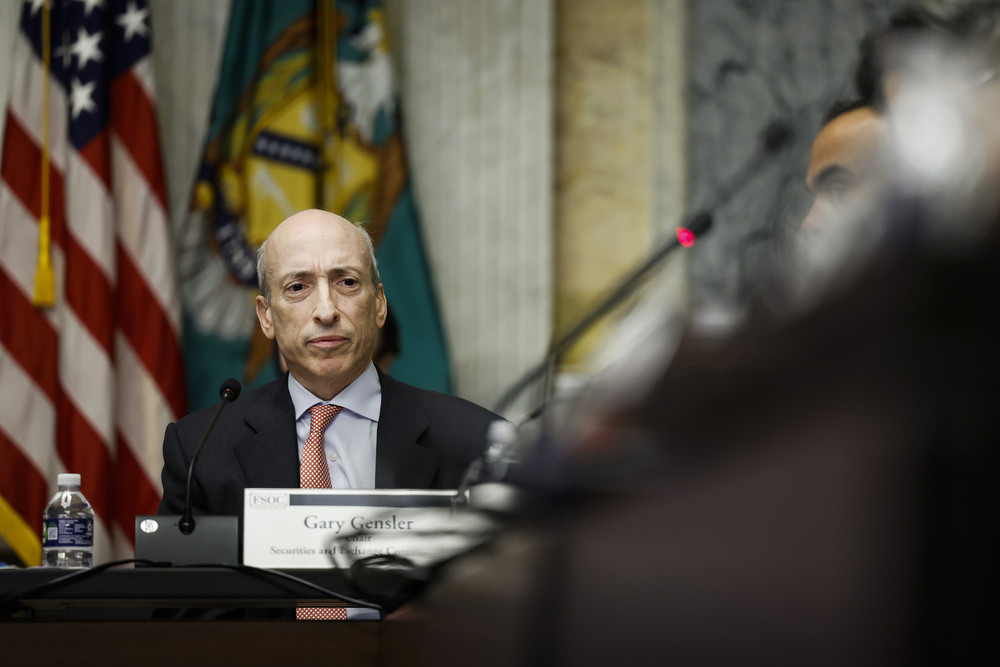| | |  | BY DECLAN HARTY |
| | 
Securities and Exchange Commission Chair Gary Gensler listens during a meeting with the Treasury Department's Financial Stability Oversight Council. | Anna Moneymaker/Getty Images | WEATHERING THE STORM — In the always online cryptocurrency universe, there’s a saying among traders: HODL, or hold on for dear life. Originally just a typo of “HOLD,” the phrase has been adopted as a mantra of sorts for crypto investors anxiously weathering wild movements in the market. But the gospel of HODL is about to take on new weight for crypto evangelists if they want to survive the heavy fire coming at the industry from President Joe Biden’s Securities and Exchange Commission. Last week, the Gary Gensler-led SEC sued the world’s largest crypto exchanges — Binance and Coinbase — less than 24 hours apart . The agency alleged that the companies, among other things, were operating unregistered stock exchanges, brokers and clearing agencies — in other words, a mishmash of financial institutions that normally operate separately to avoid potential conflicts and abuse. In the case of Binance, the charges were even more dramatic as the SEC alleged the company, along with CEO Changpeng Zhao, engineered a “web of deception” that misled investors, inflating trading volumes and more. The SEC’s one-two combo opens up what promises to be a pair of brutal courtroom battles. Binance and Coinbase have sworn to fight the agency’s charges. Coinbase Chief Legal Officer Paul Grewal said the company is willing to litigate the charges “for years.” While Binance and Coinbase have rejected the SEC’s claims, many investors, lawyers and even other firms nervously gulped. In the week since the lawsuits, Coinbase shares have plunged, as have the crypto tokens that the SEC labeled as unregistered securities — which include three of the 11 largest in the world. Meanwhile, Robinhood, the stock brokerage that allows customers to also dabble in crypto, said it was dropping the three tokens from its platforms after the SEC’s lawsuits “introduced a cloud of uncertainty ” around the assets. Gensler, after all, has given no indication that the SEC is easing up on crypto firms that resist its authority even after nailing the market’s largest players. If anything, the SEC chair appears more emboldened — and empowered — than ever to go after the “Wild West,” as he has long called crypto. “When crypto asset market participants go on Twitter or TV and say they lacked ‘fair notice’ that their conduct could be illegal, don’t believe it,” Gensler said Thursday in a sweeping speech entitled “We’ve seen this story before,” a reference to the fraud-ridden markets of the 1920s. “They may have made a calculated economic decision to take the risk of enforcement as the cost of doing business.” The Binance and Coinbase actions should be no surprise to SEC watchers. For months, Gensler has warned crypto companies that the proverbial “runway” to comply — or risk squaring off with the SEC’s enforcement attorneys — was getting shorter. And since the downfall of FTX, the crypto exchange founded by the brief Washington bigwig Sam Bankman-Fried, the SEC has followed up on its word — suing a smattering of crypto companies, moguls and even a few celebrities like Lindsay Lohan for allegedly touting tokens illegally. But the industry, by and large, is not yet yielding. Binance and Coinbase have already pushed to frame the coming fights with the SEC as referendums on the broader industry, saying that Gensler’s agency is a rogue actor squashing U.S. chances of becoming a hub for the 15-year-old crypto market at the same time that other jurisdictions like Europe embrace the asset class. Gensler argues that the push for compliance is nothing more than a matter of ensuring that investors are protected and leveling the playing field between traditional finance and crypto. Either way, what’s clearest now is that whatever comes next promises to be bumpy. Hold on. Welcome to POLITICO Nightly. Reach out with news, tips and ideas at nightly@politico.com . Or contact tonight’s author at dharty@politico.com or on Twitter at @declanharty .
| |
| |
| | | | | — Washington Post CEO to step down: Fred Ryan, publisher and CEO of The Washington Post, is stepping down , the news organization announced in a statement today. Ryan will remain the publisher of The Washington Post until August, the statement said, and Patty Stonesifer has been appointed interim CEO. Ryan, 68, has served as publisher and CEO since his appointment by Jeff Bezos, the founder of Amazon and owner of The Post, nine years ago. Ryan is leaving to lead the newly formed Center on Public Civility at the Ronald Reagan Presidential Foundation, the statement said. — Compromise struck to preserve Obamacare’s preventive care mandate: The Texas conservatives challenging Obamacare’s preventive care mandate have reached a tentative compromise with the Justice Department that preserves free coverage for a range of services — from syphilis tests to depression screenings. The agreement, which still needs approval from the 5th U.S. Circuit Court of Appeals, keeps coverage intact nationwide while the case proceeds. The Biden administration, in exchange, pledged not to enforce the mandate to cover HIV prevention drugs and other preventive care services against the employers and individual workers who sued claiming that doing so violated their religious beliefs. This means that even if the Affordable Care Act rules are upheld on appeal, the government can’t penalize the challengers for refusing to cover required services. — PGA tour to senators: You didn’t help us ‘fend off’ the Saudis: PGA Tour Commissioner Jay Monahan defended the decision to join forces with the Saudi-backed rival league LIV Golf in a letter to Congress, saying inaction from lawmakers left him little other choice . “During this intense battle, we met with several Members of Congress and policy experts to discuss the PIF’s attempt to take over the game of golf in the United States, and suggested ways that Congress could support us in these efforts,” Monahan told senators in a letter obtained by POLITICO, referring to the Saudi sovereign wealth fund, the Public Investment Fund. “While we are grateful for the written declarations of support we received from certain members, we were largely left on our own to fend off the attacks.”
| |
| | GET READY FOR GLOBAL TECH DAY: Join POLITICO Live as we launch our first Global Tech Day alongside London Tech Week on Thursday, June 15. Register now for continuing updates and to be a part of this momentous and program-packed day! From the blockchain, to AI, and autonomous vehicles, technology is changing how power is exercised around the world, so who will write the rules? REGISTER HERE . | | | | | | | THE CIRCUS IS IN TOWN — Donald Trump and his aides are eager to have a show of support and force for his first court appearance in Miami on Tuesday on charges related to the retention of classified documents and efforts to obstruct justice. But they’re stressing that they don’t want it to get out of hand , writes POLITICO’s Meredith McGraw. Before departing for Florida, the former president spent this morning at his clubhouse in New Jersey where he spoke with aides and met with a congressional ally. Trump and his team of advisers and attorneys plan to spend tonight at his golf resort in Miami preparing for his court appearance and trying to bolster his legal team. They were aware of pro-Trump rallies planned around his courthouse appearance and amplified calls for supporters to “protest peacefully.” “We need strength at this point. Everyone is afraid to do anything. They’re afraid to talk. They have to go out and protest peacefully,” Trump told ally and conservative provocateur Roger Stone on his radio show on Sunday. Stone called on Trump’s supporters planning protests to “keep it peaceful, civil and legal.” A host of Trump allies are set to descend on the city in anticipation of the arraignment. Sen. Rick Scott (R-Fla.), announced he would be holding a press conference in Miami to deliver remarks “on the indictment of former President Donald J. Trump and President Joe Biden’s abandonment of equal justice under the law.” And Kari Lake, the former gubernatorial candidate from Arizona, announced her plans to be “in Miami tomorrow to peacefully and patriotically protest in support of” Trump. But Lake today also issued a warning to anyone who might try to hurt Trump. “They’re gonna have to come through me and…300 million others,” she said. “Most of us are NRA members. That is not a threat; that is a public service announcement.” Other members of Congress have used similarly foreboding rhetoric including Reps. Clay Higgins and Andy Biggs, who declared: “We have now reached a war phase.” GLASS HALF FULL — For weeks, the two frontrunners in the Republican presidential primary have painted current events in increasingly apocalyptic terms, in a fundraising appeal, likening his indictment on Thursday to “watching our Republic DIE.” DeSantis, who had previously suggested the government is imposing a “biomedical security state,” said “the weaponization of federal law enforcement represents a mortal threat to a free society.” Many of the Republicans trailing those two in the polls are working on a different strategy — trying to carve out a less dystopian lane , writes POLITICO’s Adam Wren, Sally Goldenberg and Natalie Allison. Last week, former Vice President Mike Pence cast himself in his campaign announcement as a sunnier, Reaganesque Republican, appealing to “the better angels of our nature” and maintaining he isn’t “convinced our country is as divided as our politics”— despite a mob trying to kill him on Jan. 6, 2021. Doug Burgum, the near-anonymous North Dakota governor, talked about small-town values and “fighting to unite the country” in his campaign launch. And then there’s South Carolina Sen. Tim Scott, who has said conservatives are “starved for hope” and that the country is “a more perfect union today than we were yesterday or last year or the last decade.”
| |
| |
 | | | | | | 
A giant poster paying tribute to former Italian Premier Silvio Berlusconi hangs at the Mediaset media conglomerate headquarters in Cologno Monzese, near Milan. Berlusconi died earlier today. | Luca Bruno/AP Photo | END OF AN ERA — Silvio Berlusconi, the former Italian prime minister, has died at the age of 86, his office confirmed. Berlusconi, who was a senator and leader of the right-wing Forza Italia party — a junior partner in Prime Minister Giorgia Meloni’s coalition government — was admitted to a Milan hospital last week. A billionaire media and property tycoon-turned-politician, Berlusconi rose to the top of Italian politics in the 1990s, leading the country for close to a decade during three terms as prime minister. In the mid-1990s, he started planning for the afterlife, write Jacopo Barigazzi and Stephan Faris . On the grounds of his multi-million euro villa in Arcore, near Milan, he began building a giant underground mausoleum where he planned to be laid surrounded by more than 30 other tombs made ready for close friends, family members and romantic partners. The project was typically Berlusconi — lavish, flamboyant, treading the line between the imperious and the absurd. Visitors were escorted past a 100-ton abstract sculpture representing the vault of heaven, down an imposing stairway modeled on pre-Roman burial sites, through a narrow corridor decorated with the things he might need in the afterlife — fruit, bread, keys, a mobile phone — and into an imposing burial chamber at whose center stood a pink marble and granite sarcophagus. Berlusconi was a lot of things. A real-estate developer whose right-hand man was sentenced to seven years in prison for his ties to the mafia. A media revolutionary who introduced commercial television to Italy, establishing a stranglehold on the country’s information ecosystem. The beaming owner of the Italian football club A.C. Milan. Post-war Italy’s longest-serving prime minister. A business tycoon convicted for tax fraud. A disgraced politician brought down by reports of “bunga bunga” orgies and sex with an underage prostitute. Above all, Berlusconi was a seducer. From his early days as an occasional cruise ship crooner to his time as a real-estate salesman to his decades as a politician smiling at Italians from television shows running on the channels he owned, Berlusconi was unabashedly focused on one thing: winning over whoever was in front him. “Think of how many women there are out there who would like to go to bed with me, but don’t know it,” he was quoted as saying in a book about his rise to power. “Life is a problem of communication.” Read the full obituary of the giant in Italian politics here .
| |
| | STEP INSIDE THE WEST WING : What's really happening in West Wing offices? Find out who's up, who's down, and who really has the president’s ear in our West Wing Playbook newsletter, the insider's guide to the Biden White House and Cabinet. For buzzy nuggets and details that you won't find anywhere else, subscribe today . | | | | | | | | |
$290 million The amount that JPMorgan Chase will pay out to victims of convicted sex offender Jeffrey Epstein in a settlement over claims the bank profited from sexual abuse that victims suffered and ignored warnings about Epstein. The lawsuit alleges JPMorgan Chase gave Epstein loans while ignoring warnings about Epstein’s abuse between 1998 and 2013. Epstein died in prison in 2019 after he was arrested on federal sex trafficking charges. |
| | | LONG SECOND LIFE — Mark Zuckerberg made a big bet on his “Metaverse” as the “future of connection.” The online world, thus far, has little to show for it. But somehow, after 20 years, Second Life, a virtual world launched in 2003 (when Facebook was still in its infancy), persists, Simon Parkin reports for The Guardian. The platform has hosted company-wide meetings for IBM, faculties from Stanford and MIT, and has its own economy worth an estimated $650 million. Parkin explores why Second Life lives on as Silicon Valley powerhouses struggle to build their own metaverses.
| | | 
On this date in 1987: President Ronald Reagan speaks in front of the Brandenburg Gate in West Berlin, Germany, as he visits the city during 750th anniversary celebrations. The speech became famous for the line "Mr. Gorbachev, tear down this wall!" referring to the leader of the Soviet Union and the wall that encircled West Berlin between 1961 and 1989. | Roberto Pfeil/AP Photo | Did someone forward this email to you? Sign up here .
| |
|
| | | | |
|
| | Follow us on Twitter | | | FOLLOW US | | |
| |

No comments:
Post a Comment
Note: Only a member of this blog may post a comment.